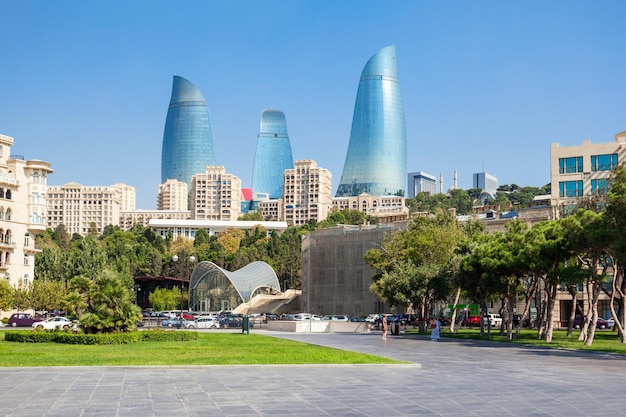Published on
October 6, 2025
The European Union (EU) is committed to strengthening its partnership with Azerbaijan, focusing on revitalizing and enhancing the transport and logistics infrastructure that connects Europe to the South Caucasus. European Commissioner for Enlargement, Marta Kos, emphasized this vision during her visit to Azerbaijan in September 2025. She expressed the EU’s readiness to collaborate with the Azerbaijani government on rebuilding, re-establishing, and rehabilitating transport routes that will bring Europe closer to Azerbaijan, fostering greater economic and political ties. In an exclusive interview with Trend, Kos highlighted the pivotal role that transport and logistics play in bridging nations and regions, offering a platform for mutual cooperation between Azerbaijan, the EU, and the broader South Caucasus region.
Building Stronger Connections Between Azerbaijan and Europe
At the heart of the EU’s vision for future cooperation with Azerbaijan lies a shared commitment to improving infrastructure and enhancing connectivity. Marta Kos outlined that the EU’s successful model of cooperation within Europe could serve as a blueprint for enhancing relations between Azerbaijan and the EU. The EU’s ability to turn historic conflicts into cooperation by focusing on concrete, mutually beneficial areas such as transport has been a significant factor in its success. Kos believes that similar progress could be made with Azerbaijan, particularly in the transport and logistics sectors, both of which have considerable economic and political importance.
These sectors are seen as key drivers for economic development, not just for Azerbaijan, but also for the wider South Caucasus region. The transport routes that connect Europe to Azerbaijan have the potential to become more than just a means of trade; they could foster deeper, more collaborative relationships, benefiting both the EU and Azerbaijan’s citizens, as well as those in neighbouring countries.
The Strategic Role of Transport and Logistics
Transport and logistics are essential components of any successful economic partnership, and Kos emphasized their critical role in building lasting relationships between nations. The EU has extensive experience in facilitating cross-border cooperation in these sectors, and it plans to apply this expertise to the benefit of both Azerbaijan and the broader region. By working together on projects related to infrastructure development, both parties can ensure the seamless flow of goods, services, and people across borders, thus increasing the potential for trade, investment, and cultural exchange.
Rehabilitating and Expanding Vital Transport Routes
One of the key areas of focus for the EU-Azerbaijan partnership is the rehabilitation and expansion of key transport routes. These routes, which connect Azerbaijan to Europe, are vital for facilitating trade, enhancing economic growth, and strengthening political relations. Kos emphasized that these routes are more than just physical connections; they represent the potential for stronger ties between the two regions, enabling greater collaboration in areas such as energy, technology, and infrastructure. By working together to improve these routes, the EU and Azerbaijan aim to build a more integrated and prosperous region that can serve as a gateway for goods and services between Europe and Asia.
Political and Economic Significance of Strengthening Transport Links
The political and economic significance of the transport and logistics sectors cannot be overstated. For Azerbaijan, enhancing its transport infrastructure is crucial for boosting trade and attracting investment. It allows the country to diversify its economy and strengthen its role as a regional hub for transport and logistics in the South Caucasus. For the EU, improving connectivity with Azerbaijan helps expand access to new markets and promotes economic stability in the region, which is crucial for both economic and political cooperation. By strengthening these links, both sides stand to benefit from enhanced trade, investment, and political dialogue.
A Vision for Mutual Success
According to Kos, the success of this cooperation will not only benefit the EU and Azerbaijan but will also have a positive impact on the broader South Caucasus region. By prioritizing areas of mutual interest, such as transport and logistics, the EU and Azerbaijan can build a foundation of trust and cooperation that will extend beyond these sectors. Kos expressed her confidence that, through the success of this partnership, the relationship between Azerbaijan and Europe could evolve into a new, positive reality. This new reality would be characterized by deeper, more sustainable cooperation across a range of sectors, ultimately leading to greater stability and prosperity for all involved.
Conclusion: A New Chapter in EU-Azerbaijan Relations
The EU’s commitment to collaborating with Azerbaijan on transport and logistics infrastructure represents a significant step towards closer ties between the two regions. By focusing on practical, mutually beneficial projects, the EU and Azerbaijan can transform their relationship into a model of cooperation, offering a blueprint for other regions in the world. The revitalization of key transport routes will not only strengthen economic and political links between Europe and Azerbaijan but will also help unlock new opportunities for growth, trade, and collaboration in the South Caucasus and beyond.
